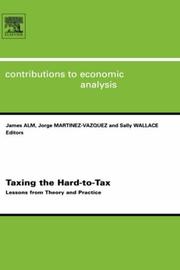| Listing 1 - 10 of 28 | << page >> |
Sort by
|
Book
Year: 2021 Publisher: Washington, D.C. : The World Bank,
Abstract | Keywords | Export | Availability | Bookmark
 Loading...
Loading...Choose an application
- Reference Manager
- EndNote
- RefWorks (Direct export to RefWorks)
There are still many countries around the world that have not effectively engaged their subnational governments in their climate change strategies and policy frameworks. Where subnational levels are involved, generally they still play a relatively small role. This paper examines how the principles of fiscal decentralization design (in expenditure and revenue assignments, transfers, and borrowing) can be adapted to successfully engage subnational governments in fighting climate change. In addition, the paper critically reviews ongoing international practices, both effective and less effective, that involve subnational governments in climate change mitigation and adaptation. Shared responsibility for policy and program design and implementation, fee-or charge-funded adaptation activities, objective-targeted intergovernmental transfers, and the use of green bonds are some of the most promising approaches analyzed. Clearly, there is ample space ahead for the further involvement of subnational governments across the world in combating climate change.
Book
ISBN: 082134840X 9786610087136 1280087137 058541503X Year: 2001 Publisher: Washington, D.C. : World Bank,
Abstract | Keywords | Export | Availability | Bookmark
 Loading...
Loading...Choose an application
- Reference Manager
- EndNote
- RefWorks (Direct export to RefWorks)
Political systems --- Public economics --- Russia --- Political Science --- Law, Politics & Government --- Public Finance --- Russia (Federation) --- Appropriations and expenditures --- Politics and government --- Russian Federation --- Rossiyskaya Federatsiya --- Rossiya (Federation) --- Rossii︠a︡ (Federation) --- Российская Федерация --- Rossiĭskai︠a︡ Federat︠s︡ii︠a︡ --- Rosiĭsʹka Federat︠s︡ii︠a︡ --- Російська Федерація --- Federazione della Russia --- Russische Föderation --- RF --- Federation of Russia --- Urysye Federat︠s︡ie --- Pravitelʹstvo Rossii --- Правительство России --- Pravitelʹstvo Rossiĭskoĭ Federat︠s︡ii --- Правительство Российской Федерации --- Правительство РФ --- Pravitelʹstvo RF --- Rosja (Federation) --- Eluosi (Federation) --- O-lo-ssu (Federation) --- 俄罗斯 (Federation) --- Roshia Renpō --- Federazione russa --- OKhU --- Orosyn Kholboony Uls --- Russian S.F.S.R. --- RF (Russian Federation) --- Россия (Federation)
Digital
ISBN: 9780387489889 Year: 2007 Publisher: Boston, MA Springer Science+Business Media, LLC
Abstract | Keywords | Export | Availability | Bookmark
 Loading...
Loading...Choose an application
- Reference Manager
- EndNote
- RefWorks (Direct export to RefWorks)
Book
ISBN: 9781849805087 Year: 2011 Publisher: Cheltenham Edward Elgar
Abstract | Keywords | Export | Availability | Bookmark
 Loading...
Loading...Choose an application
- Reference Manager
- EndNote
- RefWorks (Direct export to RefWorks)
Government --- Public administration --- Developing countries
Digital
ISBN: 082134840X Year: 2001 Publisher: Washington, D.C.
Abstract | Keywords | Export | Availability | Bookmark
 Loading...
Loading...Choose an application
- Reference Manager
- EndNote
- RefWorks (Direct export to RefWorks)
Political systems --- Public economics --- Russia

ISBN: 1280901489 9786610901487 0387489886 0387489878 1441943145 9780387489872 Year: 2007 Publisher: New York : Springer,
Abstract | Keywords | Export | Availability | Bookmark
 Loading...
Loading...Choose an application
- Reference Manager
- EndNote
- RefWorks (Direct export to RefWorks)
These original essays highlight the state of knowledge in intergovernmental transfer design. They represent creative new thinking about challenging policy issues and offer useful options for policy makers. Five specific themes are covered in separate sections. They include: The fundamental nature and objectives of equalization grants and their consequences on efficiency and equity; The appropriate institutional setting for the design and implementation of equalization grant systems; The challenges in the design of formulas with limited data availability for recurrent and capital purposes; The coordination of equalization grants with other related policies; The political economy behind equalization transfers. "There is a genuine need for this book; it will become a 'benchmark' reference. I am impressed with its content, organization, readability, and fresh thematic approach." Robert D. Ebel, The World Bank .
Intergovernmental fiscal relations --- Fiscal policy --- Equality --- Revenue sharing --- Federal-state fiscal relations --- Fiscal relations, Intergovernmental --- State-local fiscal relations --- Federal government --- Finance, Public --- Local finance --- Federal-state program swaps --- State-federal program swaps --- Tax sharing --- Turnback of federal programs to states --- Intergovernmental tax relations --- Urban policy --- Law and legislation --- Public finance. --- Development economics. --- Public Economics. --- Development Economics. --- Economics --- Economic development --- Cameralistics --- Public finance --- Currency question --- 336.2 --- Belastingen. Belastingswezen. Openbare financien. Belastingspolitiek. Belastingstheorie. Belastingsharmonisatie. Fiskale politiek. Belastingsleer. Belastingsdruk. Belastingstechniek. Belastingsstelsel.Belastingstarief --- Public finances
Book
ISBN: 1280087692 9786610087693 058545910X 0821350439 Year: 2001 Publisher: Washington, D.C. : World Bank,
Abstract | Keywords | Export | Availability | Bookmark
 Loading...
Loading...Choose an application
- Reference Manager
- EndNote
- RefWorks (Direct export to RefWorks)
Finance, Public --- Intergovernmental fiscal relations --- Federal-state fiscal relations --- Fiscal relations, Intergovernmental --- State-local fiscal relations --- Federal government --- Local finance --- Cameralistics --- Public finance --- Currency question --- Law and legislation --- Public finances

ISBN: 0821365576 0821365584 9780821365571 9780821365588 9786610373338 1280373334 Year: 2006 Publisher: Washington, DC : World Bank,
Abstract | Keywords | Export | Availability | Bookmark
 Loading...
Loading...Choose an application
- Reference Manager
- EndNote
- RefWorks (Direct export to RefWorks)
The exposition is based on an analytical framework covering all ?building blocks? of fiscal federalism: size and structure of jurisdictions, expenditures, revenues, transfers, and borrowing. The application of this framework to Russian settings results in a comprehensive assessment of the state of intergovernmental fiscal relations in Russia.
Public finance --- Russia --- Intergovernmental fiscal relations --- Local finance --- Finance, Public

ISBN: 0444516778 9786611027407 1849508283 1281027405 0080547613 9781849508285 9780444516770 Year: 2004 Volume: 268 Publisher: Amsterdam ; Oxford : Elsevier,
Abstract | Keywords | Export | Availability | Bookmark
 Loading...
Loading...Choose an application
- Reference Manager
- EndNote
- RefWorks (Direct export to RefWorks)
The goal of this edited volume is to take a hard, objective look at the many different aspects of taxing the hard-to-tax, as well as the many different approaches that have been employed around the world. In the developed and developing world, taxing certain kinds of activities, sectors, or individuals - the so-called hard-to-tax - is a challenge for governments. In the past, the practical side of this issue has received some attention, mainly from those working in the trenches of tax administration. There has also been some analytical work on such things as presumptive taxation, as well as some empirical work on measuring the hard-to-tax. However, the lessons from all of this work have been very unevenly disseminated, and there are clearly many unresolved issues. With the steady advance of such things as globalization, internet commerce, and tax shelters, the issues in taxing the hard-to-tax will become even more pressing.
Taxation. --- Tax evasion. --- Tax assessment. --- Tax collection. --- Impôt --- Fraude fiscale --- Assiette de l'impôt --- Recouvrement --- Collection of taxes --- Tax delinquency --- Taxes, Collection of --- Tax administration and procedure --- Taxpayer compliance --- Assessed valuation --- Assessment --- Assessment, Tax --- Property tax --- Real property tax --- Evasion, Fiscal --- Fiscal evasion --- Tax avoidance --- Tax-dodging --- Tax fraud --- Taxation --- Taxation, Evasion of --- White collar crimes --- Duties --- Fee system (Taxation) --- Tax policy --- Tax reform --- Taxation, Incidence of --- Taxes --- Finance, Public --- Revenue --- Evasion --- Mathematics --- Business & Economics --- Monetary policy. --- Mathematical analysis. --- Mathematical Analysis. --- Money & Monetary Policy. --- 517.1 Mathematical analysis --- Mathematical analysis --- Monetary management --- Economic policy --- Currency boards --- Money supply
Book
ISBN: 9781782544296 Year: 2013 Publisher: Cheltenham Edward Elgar
Abstract | Keywords | Export | Availability | Bookmark
 Loading...
Loading...Choose an application
- Reference Manager
- EndNote
- RefWorks (Direct export to RefWorks)
In the efficient delivery of local public services, size matters. Many countries around the world have vertical government structures that are perceived as inefficient because of their high levels of jurisdictional fragmentation. This timely volume examines the different strategies used to address local government fragmentation and their observed results and consequences. Expert contributors in economics and political science offer a comprehensive breakdown of the issue of local jurisdiction fragmentation and provide recommendations for successful policy reform. Topics discussed include economies of scale, the costs and benefits of voluntary and forced amalgamation programs, the correlation between government size and corruption, privatization, and inter-municipal cooperation. A combination of theory and empirical evidence provides depth and makes this book an invaluable addition to the literature. Economists, public administrators and political scientists will find much of interest in this innovative volume, as will professors, students and international institutions with an interest in local government structure and reform.
| Listing 1 - 10 of 28 | << page >> |
Sort by
|

 Search
Search Feedback
Feedback About UniCat
About UniCat  Help
Help News
News